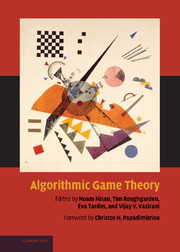Book contents
- Frontmatter
- Contents
- Foreword
- Preface
- Contributors
- I Computing in Games
- II Algorithmic Mechanism Design
- III Quantifying the Inefficiency of Equilibria
- 17 Introduction to the Inefficiency of Equilibria
- 18 Routing Games
- 19 Network Formation Games and the Potential Function Method
- 20 Selfish Load Balancing
- 21 The Price of Anarchy and the Design of Scalable Resource Allocation Mechanisms
- IV Additional Topics
- Index
20 - Selfish Load Balancing
from III - Quantifying the Inefficiency of Equilibria
Published online by Cambridge University Press: 31 January 2011
- Frontmatter
- Contents
- Foreword
- Preface
- Contributors
- I Computing in Games
- II Algorithmic Mechanism Design
- III Quantifying the Inefficiency of Equilibria
- 17 Introduction to the Inefficiency of Equilibria
- 18 Routing Games
- 19 Network Formation Games and the Potential Function Method
- 20 Selfish Load Balancing
- 21 The Price of Anarchy and the Design of Scalable Resource Allocation Mechanisms
- IV Additional Topics
- Index
Summary
Abstract
Suppose that a set of weighted tasks shall be assigned to a set of machines with possibly different speeds such that the load is distributed evenly among the machines. In computer science, this problem is traditionally treated as an optimization problem. One of the classical objectives is to minimize the makespan, i.e., the maximum load over all machines. Here we study a natural game theoretic variant of this problem: We assume that the tasks are managed by selfish agents, i.e., each task has an agent that aims at placing the task on the machine with smallest load. We study the Nash equilibria of this game and compare them with optimal solutions with respect to the makespan. The ratio between the worst-case makespan in a Nash equilibrium and the optimal makespan is called the price of anarchy. In this chapter, we study the price of anarchy for such load balancing games in four different variants, and we investigate the complexity of computing equilibria.
Introduction
The problem of load balancing is fundamental to networks and distributed systems. Whenever a set of tasks should be executed on a set of resources, one needs to balance the load among the resources in order to exploit the available resources efficiently. Often also fairness aspects have to be taken into account. Load balancing has been studied extensively and in many variants.
Information
- Type
- Chapter
- Information
- Algorithmic Game Theory , pp. 517 - 542Publisher: Cambridge University PressPrint publication year: 2007
Accessibility standard: Unknown
Why this information is here
This section outlines the accessibility features of this content - including support for screen readers, full keyboard navigation and high-contrast display options. This may not be relevant for you.Accessibility Information
- 58
- Cited by
